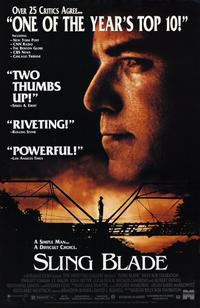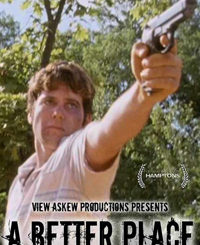 Sling Blade
Sling Blade
with Billy Bob Thornton, John Ritter
Written and directed by Billy Bob Thornton
by Michael McCarthy
Much has already been said about this now-famous Billy Bob Thornton film. Then again, more has recently been said about Thornton himself. Of the film, people generally agree that it’s a great little tale, intrigued by the strangely heartwarming/homicidal mentally retarded leading man. Of Thornton, people generally agree that it’s an act of true devotion to the crafts of filmmaking and acting for someone who spent so long kicking around in unnoticeable bit parts to have pulled it off. I would agree with both of those opinions.
Thornton’s performance as Karl Childers is immensely impressive. Heck, it puts Tom Hanks’ turn as Forrest Gump to shame. As Karl, Thornton will make you smile with him and believe that there is still good in the world, this even though Karl spent much of his life in a “nervous hospital” for manslaughter. The question I’d like to raise, however, is this: How much of the film’s – and Thornton’s – success stems from Thornton’s screenplay? After all, it won him the Best Adapted Screenplay (from his original play) award at this year’s Oscar fest.
I attest that Sling Blade‘s success is not because of the screenplay, for the screenplay contains one major, ridiculous flaw. What is this flaw? Essentially, it is the film’s entire plot. Let me remind you that Karl Childers is mentally retarded. Because of this, he was placed in the “nervous hospital” (mental hospital) instead of jail when he committed brutal murder as a child.
Now, a few decades later, following an interview by two horrible actresses posing as journalists, Karl Childers is released unto the world from this hospital. Does he want to leave? No. He even expresses this to the man in charge. Furthermore, he returns to the hospital a few hours later, again saying he wants to stay there. The man in charge says, and justifiably so, that he can’t allow that. Instead, he allows Karl to spend a night in his home then sets him up with a job repairing small engines at a garage where he can live in the backroom.
That would never happen in real life. Never. There is not a state in the continental United States that would allow such a thing. What would really happen is that Karl would be placed in a staffed group home (a halfway house, so to speak) until he was genuinely ready to get his own place, if and when that time came. Let’s suppose such homes don’t exist in Karl’s neck of the woods. At the very least, he’d be set up in an apartment where he’d be checked on by a community services case manager on a frequent if not daily basis. Now, if Karl were presumed competent, which I’m assuming is the reason Thornton used to justify his release when writing the script, and Karl did not want the help of the state, then it is likely that he would have been left on his own accord. However, again, Karl did not want this at all and went out of his way to express this. Thus, the script’s tragic flaw.
You can dissect this major plot error even further when you consider the social security system. Why was Karl, who clearly would have been receiving SSI for being mentally disabled, let out with barely enough money to buy french fried pataters? The hospital would have been receiving his SSI checks all the years he resided there and banking anything left over. This money would have been given to him upon his release. While we’re not talking big bucks, it’s extremely unlikely (if not impossible) that Karl would have left the hospital with under a thousand dollars! In fact, he probably would have accumulated two grand by that point. The only reason he would not have more is that a spend down is required when a mentally retarded person on SSI reaches such an amount of money in savings unless said retarded person’s caretakers desire to watch the person’s SSI be cut.
And what about the legal system? It’s highly plausible that Karl would have been placed on probation upon release. It may have been lenient, but it would almost certainly have happened. Especially in a small town where everyone has heard the horror stories about why he ended up in the “nervous hospital.” Yet, Thornton’s script has Karl, uh, free as a bird.
My point here is simple. I believe Billy Bob Thornton received his Best Screenplay Oscar (albeit an adapted one) for Sling Blade because it was such a touching slice of life drama. By definition, said films must be realistic to succeed. In actuality, Thornton’s story may as well have been a fairy tale because the very premise which he has used to launch it is entirely bogus if not absurd.
Do I like Sling Blade? I love it. I would have been thrilled to see Thornton awarded Best Actor. I probably wouldn’t have frowned if he were awarded best director or best film either. However, to cite Sling Blade as a masterpiece in screenwriting, to say that its screenplay is its most valuable asset – the genius of the film – is as insane as the flawed premise at the center of the script itself.
The English Patient was an utterly boring film, but a great screenplay. It won Best Picture. Sling Blade was a great film, with a seriously flawed screenplay. It won Best Adapted Screenplay. I’m starting to wish the public could impeach the Academy. Do they even know which hand is left anymore? Obviously, they’ve little notion which is right.



